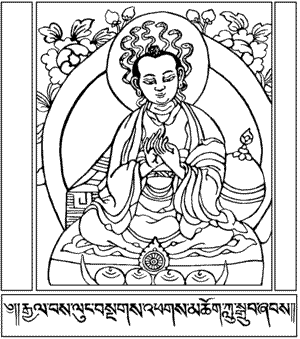Nagarjuna
3rd-century Indian Buddhist philosopher
Nāgārjuna (c. 150 – 250), sometimes called the "second Buddha" in Tibetan and East Asian Mahayana traditions, was an Indian Buddhist monk and philosopher. He systematized Mahayana Buddhist philosophy around the central concept of the emptiness (shunyata) of all existents (dharmas).



Mūlamadhyamakakārikā
editNo suffering is self-caused.
If suffering were caused by each,
Nothing causes itself.
If another is not self-made,
How could suffering be caused by another?
Suffering could be caused by both.
Not caused by self or by other,
How could suffering be uncaused?- Mūlamadhyamakakārikā 14.8–9
- trans. Jay Garfield, The Fundamental Wisdom of the Middle Way (1995), ISBN 0195093364
- "I, without grasping will pass beyond sorrow,
And I will attain nirvāṇa," one says.
Whoever grasps like this
Has great grasping.- § 16.9
- If you think you see both
Destruction and becoming,
Then you see destruction and becoming
Through impaired vision.- § 20.11
Major attributed works
editRatnāvalī (Precious Garland)
edit- Due to having faith one relies on the practices,
Due to having wisdom one truly knows.
Of these two wisdom is the chief,
Faith is its prerequisite.- The Precious Garland, 5
- trans. by Jeffrey Hopkins, "Buddhist Advice for Living and Liberation: Nagarjuna's Precious Garland" (1998), ISBN 1559398515
- "I am not, I will not be.
I have not, I will not have."
That frightens all the childish
And extinguishes fear in the wise.- § 26
- Even if you seek to harm an enemy,
You should remove your own defects and cultivate good qualities.
Through that you will help yourself,
And the enemy will be displeased.- § 132
- There is pleasure when a sore is scratched,
But to be without sores is more pleasurable still.
Just so, there are pleasures in worldly desires,
But to be without desires is more pleasurable still.- § 169
- Without hope of reward
Provide help to others.
Bear suffering alone,
And share your pleasures with beggars.- § 272
- Even three times a day to offer
Three hundred cooking pots of food
Does not match a portion of the merit
In one instant of love.- The Precious Garland, 283
Suhṛllekha (Letter to a Good Friend)
edit- To those possessed of breeding, learning, handsome looks,
Who have no wisdom, neither discipline, you need not bow.
But those who do have these two qualities,
Though lacking other virtues, you should revere.- Letter to a Friend (Snow Lion: 2013), stanza 28
Other attributed works
editPrajñadanda (The Staff of Wisdom)
edit- The science, which teaches arts and handicrafts
Is merely science for the gaining of a living;
But the science which teaches deliverance from worldly existence,
Is not that the true science?- Prajñadanda (The Staff of Wisdom) attributed to Nagarjuna
- "Although you may spend your life killing,
You will not exhaust all your foes.
But if you quell your own anger,
your real enemy will be slain."- Nagarjuna & Sakya Pandita. (1977). Elegant sayings. Cazadero, California: Dharma Publishing.
Misc
edit- If you desire ease, forsake learning.
If you desire learning, forsake ease.
How can the man at his ease acquire knowledge,
And how can the earnest student enjoy ease?
Quotes about Nagarjuna
edit- Dr. Hong [Tao-Tze, master of the qigong menpai Tai Ji Men,] and his dizi had a very painful experience of what the “lack of conscience” is. The lack of conscience of corrupted bureaucrats and officers created the Tai Ji Men case. The great Buddhist sage Nagarjuna (150–250) wrote in his “Treatise on the Great Perfection of Wisdom” that the greatest master is the one capable of “changing poison into medicine.” It is because they experienced the poison of the lack of conscience that Dr. Hong and his dizi were able to administer to the world the medicine of conscience. That we celebrate today the International Day of Conscience proves that the medicine has been effective.
- Massimo Introvigne, “Zeno’s Conscience” and the Conscience of Tai Ji Men, Bitter Winter, April 4, 2022
See also
editExternal links
editEncyclopedic article on Nagarjuna on Wikipedia